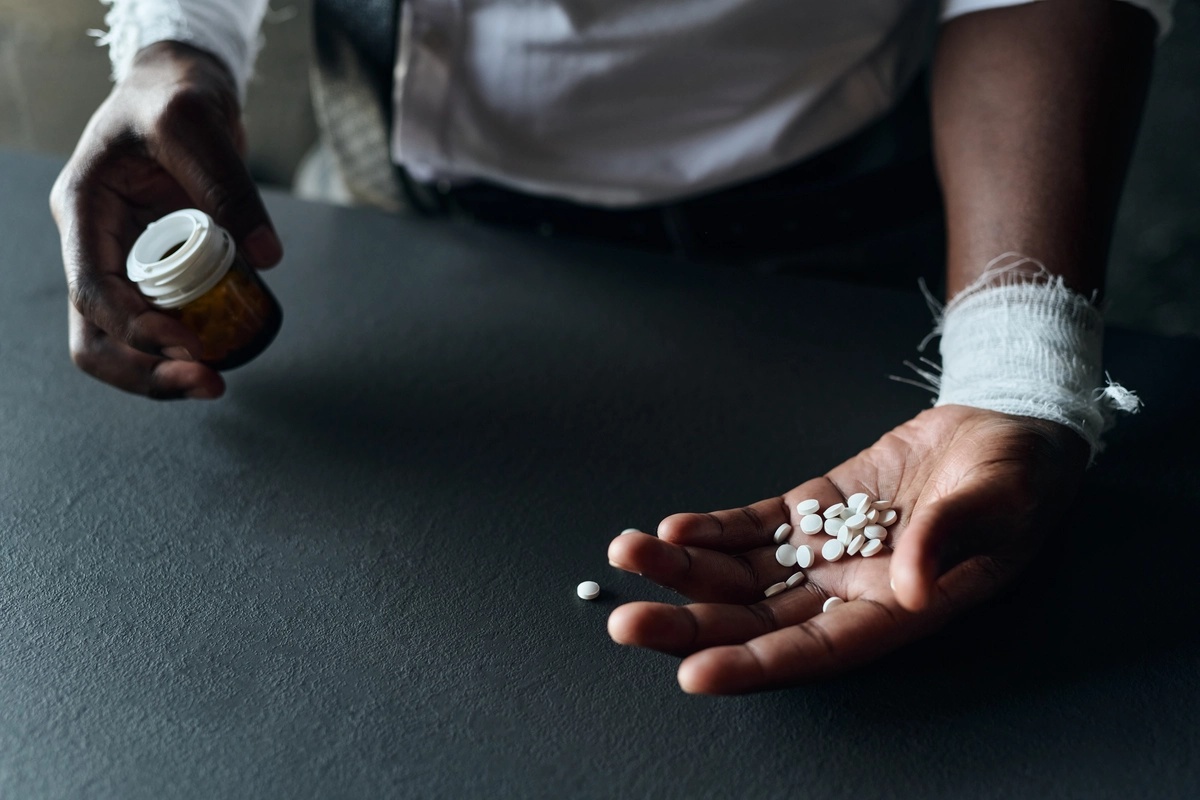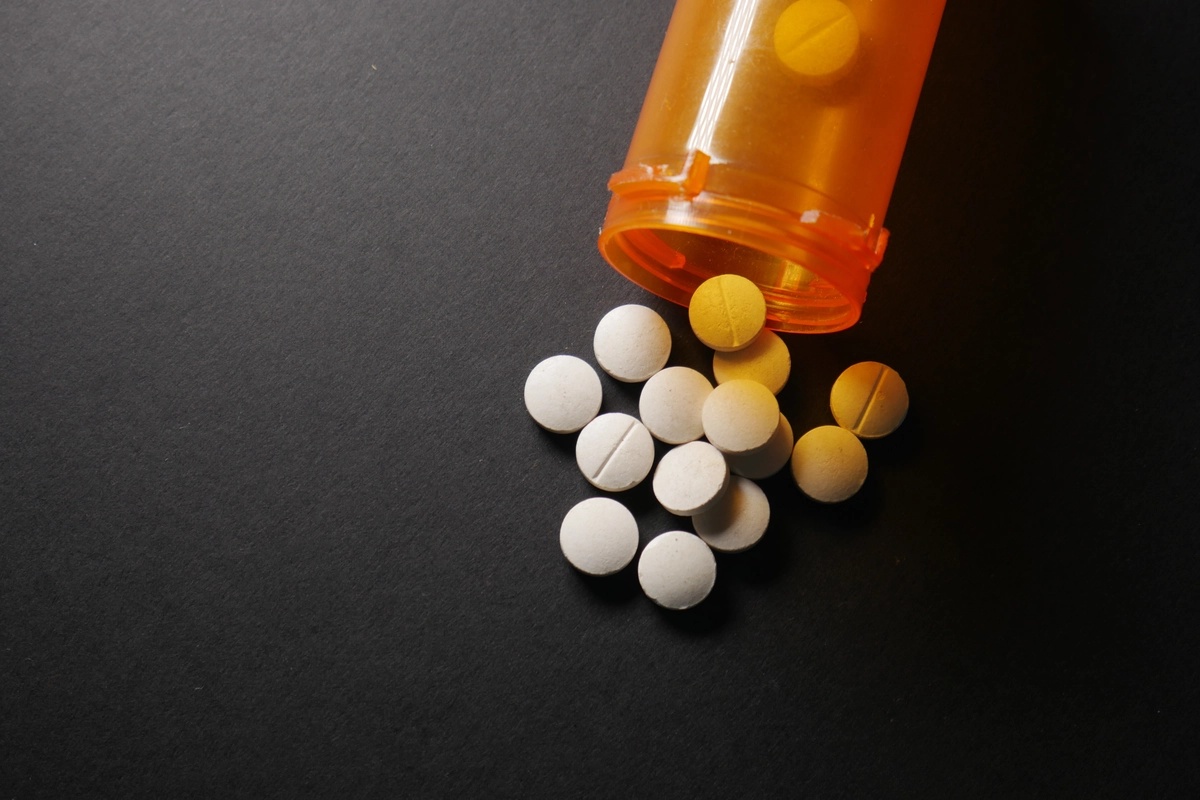Prescription Drug Addiction: Symptoms, Treatment Options, & Prevalence


Prescription drug addiction can be a silent struggle, often starting with a legitimate need for pain management and spiraling into a cycle that impacts your health, relationships, and overall quality of life. But with the right treatment and support, you can regain control. Learn more about the symptoms, causes, and treatment options here, and reach out to The Forge Recovery Center today to begin your journey towards recovery.
What Is Prescription Drug Addiction?
Prescription drug addiction refers to the compulsive use of medications that have been prescribed by a doctor. This type of addiction can develop when individuals misuse prescription drugs or take them in ways other than directed, such as taking higher doses or using them recreationally. Over time, a person may become physically and psychologically dependent on the medication, leading to withdrawal symptoms when they try to stop using it.
An addiction to prescription drugs can have serious consequences on your health, relationships, and overall well-being. It’s essential for those struggling with prescription drug addiction to seek help from healthcare professionals, as well as their support systems, to overcome this challenging condition.
Difference From Recreational Drug Use
Prescription drug addiction differs from recreational drug use in several ways. While recreational drug use is often sporadic and for enjoyment purposes, prescription drug addiction involves a compulsive need for the medication to function normally. Unlike recreational users who may have more control over their usage, individuals with a prescription drug addiction find it challenging to stop despite negative consequences.
Symptoms of Prescription Drug Addiction
Prescription drug addiction carries both physical and behavioral symptoms, including headaches, nausea, mood swings, and more. Here’s a quick overview of the common signs of prescription drug addiction:
Physical Signs
Prescription drug addiction can manifest through various physical signs, such as frequent headaches, nausea, and dizziness. Other common indicators include changes in appetite and sleep patterns, as well as unexplained weight loss or gain. These signs may differ based on the type of prescription drug being abused.
Some prescription drugs, like opioids, may lead to pinpoint pupils and slowed breathing, while stimulants can cause increased heart rate and elevated blood pressure. Recognizing these physical signs early is crucial for prompt intervention and seeking help.
Behavioral Changes
Behavioral changes associated with prescription drug addiction can include mood swings, irritability, and secrecy about medication use. Individuals might exhibit doctor shopping to obtain multiple prescriptions or engage in deceptive behaviors to hide their addiction.
These behavioral changes not only impact personal relationships but also interfere with daily activities like work or school. Addressing these changes through comprehensive treatment programs is essential to overcome addiction and rebuild healthy habits.

Are You Struggling with Mental Health or Addiction?
We Can Help. Call Us Now!
CALL: 877-839-1772
Prescription Drug Addiction Treatment Overview
Detox
When undergoing detox for prescription drug addiction, you eliminate all traces of the substance from your body. This initial step is crucial in breaking the physical dependence on the medication. Facing challenges like nausea, insomnia, and anxiety during detox is common, which is why medical professionals closely monitor you to manage these withdrawal symptoms effectively. The presence of medical experts ensures that detox is safe and as comfortable as possible. They can provide medications to ease withdrawal symptoms.
Inpatient Care
Inpatient care offers a structured environment where you receive round-the-clock support for your prescription drug addiction. This intensive setting allows for focused treatment and supervision, with therapies and counseling sessions taking place throughout the day. The 24/7 support in inpatient care helps you stay accountable, ensuring a higher likelihood of successful recovery from prescription drug addiction.
Outpatient Treatment
Outpatient programs offer flexibility, allowing you to attend therapy sessions while continuing with your daily routines. This setup enables you to balance work, school, or family responsibilities with treatment. Despite not being under constant supervision, outpatient treatment provides access to therapy sessions and support groups.
The success of outpatient treatment often relies on having a strong support system at home. Choosing an outpatient program means taking responsibility for attending appointments and actively participating in your recovery journey.
Aftercare
Aftercare plays a vital role in maintaining long-term sobriety after completing a prescription drug addiction treatment program. Engaging in counseling sessions and support groups helps you navigate challenges post-treatment, and continuing with aftercare services can significantly reduce the risk of relapse by providing ongoing support and guidance.
These programs focus on promoting overall well-being and preventing setbacks in your recovery journey. Participating in aftercare demonstrates your commitment to staying sober and prioritizing your mental health post-treatment.
Therapies Used in Treatment
Therapies commonly used to treat prescription drug addiction include certain medical interventions, as well as medication-assisted treatment (MAT). Here’s a quick overview of what to expect:
Medical Interventions
When addressing prescription drug addiction, various medical interventions play a crucial role. Healthcare professionals are pivotal in prescribing and closely monitoring medications to ensure effective treatment. The significance lies in tailoring these interventions to suit each individual's specific needs.
In treating prescription drug addiction, healthcare providers are responsible for prescribing medications and overseeing their usage. They carefully monitor the patient's progress and adjust treatments as needed. Personalized medical interventions are key, as they address the unique challenges and requirements of each individual.
Utilizing a range of medical interventions, healthcare professionals aim to combat prescription drug addiction effectively. By prescribing appropriate medications tailored to the individual's condition, they help manage withdrawal symptoms and cravings. This personalized approach ensures that treatment aligns with the patient's specific needs and circumstances.
Medication-Assisted Treatment (MAT)
Medication-assisted treatment (MAT) is a comprehensive approach used to tackle prescription drug addiction effectively. This method combines medications with therapy to provide a holistic treatment plan. Commonly used medications in MAT target cravings and alleviate withdrawal symptoms, supporting individuals throughout their recovery journey.
In medication-assisted treatment, healthcare providers integrate medications into the overall therapy plan to enhance its effectiveness. These medications work synergistically with counseling and behavioral therapies to address both the physical and psychological aspects of addiction. By combining medication with therapy, MAT offers a comprehensive solution for long-term recovery.
Incorporating medication-assisted treatment into the recovery process has shown promising results in combating prescription drug addiction. By utilizing medications targeted at managing cravings and withdrawal symptoms, individuals can navigate their recovery journey more effectively. The integration of MAT with therapy enhances treatment outcomes by addressing both the physical and emotional aspects of addiction.
Are You Struggling with Mental Health or Addiction?
We Can Help. Call Us Now!
CALL: 877-839-1772
Causes of Prescription Drug Addiction
Prescription drug addiction commonly arises after abusing a prescription medication. However, certain factors such as being unaware of the addictive nature of the drug, having an underlying mental health disorder, or having a genetic predisposition to addiction can also play significant roles. Let’s explore these causes further:
Accessibility
When seeking treatment for prescription drug addiction, you may encounter challenges in accessing services due to limited resources and long wait times. Improving accessibility to treatment is crucial for individuals struggling with addiction. To enhance accessibility, increasing funding for treatment centers and expanding telemedicine options can provide easier access to support.
Pain Management
Prescription drug addiction often stems from the need for pain management, leading individuals to rely on medications that carry a high risk of addiction. Exploring alternative pain management strategies such as physical therapy, acupuncture, or cognitive-behavioral therapy can help reduce the risk of addiction. It's vital to address pain effectively while minimizing the potential for developing an addiction.
Unaware of Addictive Nature
Many people are unaware of the addictive nature of prescription drugs, mistakenly believing they are safe because they are prescribed by healthcare professionals. Using prescription medications without understanding their addictive properties can lead to dependency and addiction. Education and awareness campaigns play a critical role in preventing prescription drug addiction by informing individuals about the risks involved.
Mental Health Disorders
The presence of mental health disorders can significantly contribute to the development of prescription drug addiction. Co-occurring conditions like anxiety or depression may drive individuals to self-medicate with prescription drugs, increasing the likelihood of addiction. Integrated treatment that addresses both mental health issues and addiction simultaneously is essential for comprehensive recovery.
Genetics
Genetics plays a significant role in determining an individual's susceptibility to prescription drug addiction. Certain genetic factors can influence how your body responds to prescription medications, impacting your risk of developing an addiction. Genetic testing can provide valuable insights into personalized treatment approaches, helping tailor interventions based on your genetic predispositions.

Consequences of Prescription Drug Addiction
If left untreated, prescription drug addiction can carry detrimental effects for your physical and mental health in the long run, including:
Physical Effects
When you are addicted to prescription drugs, your body undergoes various physical changes. The misuse of opioids can lead to respiratory depression, constipation, and even overdose. Stimulants, on the other hand, can cause increased heart rate, high blood pressure, and weight loss. Sedatives and tranquilizers may result in drowsiness, confusion, and impaired coordination.
Different types of prescription drugs affect your physical health differently. Opioids primarily impact the central nervous system and can lead to dependence with prolonged use. Stimulants affect brain chemicals that control attention and impulse control. Sedatives depress the central nervous system, causing relaxation but also increasing the risk of addiction.
Untreated physical effects of prescription drug addiction can have severe long-term consequences. Chronic opioid use can result in tolerance, meaning you need higher doses for the same effect. Stimulant abuse may lead to cardiovascular issues like heart attacks or strokes. Prolonged sedative use can cause memory problems and cognitive impairments.
Psychological Effects
Prescription drug addiction not only affects your body but also takes a toll on your mental health. Addiction can alter your brain chemistry, leading to anxiety, depression, and mood swings. It can also disrupt your behavior patterns, making it challenging to maintain relationships or hold down a job.
The psychological effects of addiction extend beyond mood changes; they can impact cognitive function too. Memory problems, poor decision-making skills, and impaired judgment are common consequences of prescription drug addiction. These effects can further exacerbate your struggles with substance abuse and make it harder to break free from the cycle.
Addressing these psychological effects is crucial for recovery. Therapy and counseling play a vital role in helping you understand the root causes of addiction and develop coping mechanisms. By addressing the underlying psychological issues driving your substance abuse, you can work towards long-term sobriety and improved mental well-being.
Are You Struggling with Mental Health or Addiction?
We Can Help. Call Us Now!
CALL: 877-839-1772
Highly Addictive Prescription Drugs
Commonly abused prescription drugs include opioids, sedatives, and stimulants, such as Adderall. Here’s a roundup of the most commonly abused and highly addictive prescription drugs to be aware of:
Opioids
Prescription medications like opioids are a significant contributor to prescription drug addiction. The addictive nature of opioids can quickly lead to dependence, making it challenging for individuals to stop using them. Opioid addiction is a concerning subset of prescription drug addiction, with painkillers being commonly misused.
The prevalence of opioid addiction has had devastating effects on individuals and communities. The powerful pain-relieving properties of opioids make them highly sought after, leading many individuals to misuse them. This misuse can result in severe health consequences, including overdose and even death. Specialized treatment approaches, such as medication-assisted therapy and counseling, are crucial in addressing opioid addiction effectively.
Sedatives
Sedative medications, another category of prescription drugs, pose risks in contributing to addiction. These drugs depress the central nervous system, inducing a calming effect that can be addictive over time. Your body may develop tolerance to sedatives, requiring higher doses to achieve the same effect, increasing the risk of addiction.
The sedative effects of these medications can lead to physical and psychological dependence if not used properly. Safe prescribing practices by healthcare providers are essential in preventing the misuse and potential addiction to sedatives. Monitoring your intake of sedatives and following prescribed dosages strictly can help mitigate the risk of developing an addiction.
Stimulants
Stimulant medications, commonly prescribed for conditions like ADHD, have effects on the brain and body that can be addictive. These drugs increase alertness and attention by boosting certain chemicals in the brain. However, misuse or taking stimulants without a prescription can lead to dependency and addiction.
The misuse potential of stimulants lies in their ability to produce feelings of euphoria and increased energy levels when taken in higher doses than prescribed. Monitoring your use of stimulant medications as directed by your healthcare provider is crucial in preventing addiction. Seeking help from medical professionals if you feel you are developing a dependency on stimulants is vital for early intervention.

Recognizing Withdrawal Symptoms
Recognizing when you’re in withdrawal can be a clear sign that treatment is necessary. If you or a loved one are experiencing any of the following symptoms, it may be wise to contact your healthcare provider and seek treatment:
Physical Symptoms
Common physical symptoms experienced by individuals with prescription drug addiction include nausea, sweating, and muscle aches.
Physical symptoms can vary based on the type of prescription drug used, such as opioids, stimulants, or sedatives.
Recognizing physical symptoms is crucial for early intervention to prevent severe health complications.
Psychological Symptoms
Psychological symptoms linked to prescription drug addiction encompass anxiety, depression, and mood swings.
These psychological symptoms can significantly impact your mental health and overall well-being.
Addressing psychological symptoms through therapy and counseling is vital for effective recovery.
Are You Struggling with Mental Health or Addiction?
We Can Help. Call Us Now!
CALL: 877-839-1772
Prevalence of Prescription Drug Addiction
According to statistics from the NCDAS, 6% of Americans abuse prescriptions each year, and nearly 12% of prescription drug abusers are addicted. For a breakdown of misuse according to the type of prescription (data as of 2021 per the NIDA):
1.3% of Americans reported misusing prescription stimulants in the past year
3.1% reported using prescription pain relievers in the past year
1.7% reported misusing prescription stimulants in the past year
1.4% reported misusing benzodiazepines in the past year
Closing Thoughts
Understanding the insidious nature of prescription drug addiction is crucial. Recognizing the symptoms, seeking appropriate treatment, and managing withdrawal are vital steps towards recovery. By shedding light on the causes, consequences, and prevalence of this issue, you can make informed decisions to safeguard your well-being or support someone in need.
Take charge of your health today. Educate yourself, seek help if necessary, and remember that recovery is possible. Your actions matter in combating prescription drug addiction. Stay informed, stay vigilant, and together, we can overcome this challenge.
Prescription Drug Addiction Treatment in Orange County
Battling prescription drug addiction can feel like a lonely journey, often beginning with a genuine need for pain relief and escalating into a cycle that affects your health, relationships, and life. But it’s important to remember that you’re not alone, and recovery is within reach. With appropriate treatment, a new chapter can begin. The Forge Recovery Center, located in Orange County, California, is fully equipped with a team of treatment experts and a range of evidence-based treatments to guide you on your recovery journey.
Contact us today if you or a loved one are in need of professional support.
Treatment Modalities We Offer
At The Forge Recovery Center, we provide a range of evidence-based treatment approaches to aid your journey to recovery, including:
Case Management
Case management provides essential support to patients by guiding them through the necessary time and resources for recovery, thereby increasing their chances of overcoming opioid addiction.
CBT
Cognitive-behavioral therapy (CBT) is a potent technique that assists individuals in recognizing and modifying detrimental thoughts and behaviors associated with drug misuse, including fentanyl abuse.
DBT
Dialectical behavior therapy (DBT) supports individuals in recognizing their emotions and striving for positive change, crucial for those with high substance tolerance and fighting addiction.
EMDR
Eye movement desensitization and reprocessing (EMDR) therapy targets the traumatic memories that could trigger addiction, using eye movements to process these events and reduce their influence on one’s life.
Experiential
Engagement in experiential activities allows those in recovery to confront past traumas, often a significant factor in opioid misuse, and explore new ways to enjoy life without dependence on substances.
Family Counseling
Family counseling plays a key role in strengthening an individual’s resilience against fentanyl addiction, with family members playing a significant part in fostering healing and resilience.
Group Therapy
Group therapy fosters a setting where individuals can share their experiences and provide mutual support, emphasizing that no one is alone in their battle against addiction.
Individual Therapy
Personalized individual therapy sessions address the unique challenges and behaviors of an individual, guiding them toward a life free from drugs and alcohol.
MAT
Medication-assisted treatment (MAT) combines behavioral therapies with approved medications to address opioid use disorders, providing help when necessary.
TMS
Transcranial magnetic stimulation (TMS) uses magnetic fields to stimulate brain cells, offering hope in reducing intense cravings and breaking the cycle of addiction.
Motivational Interviewing
Motivational interviewing helps individuals discover their motivation for change, especially beneficial for those dealing with cocaine or fentanyl addiction.
Trauma-Informed Care
Trauma-informed care takes into account how trauma symptoms may impact a person’s addiction and recovery, ensuring a compassionate and effective treatment approach.



